https://www.youtube.com/watch?v=8VSezJ8MrgA
My 10 Step Method to Perfect Steak @Home
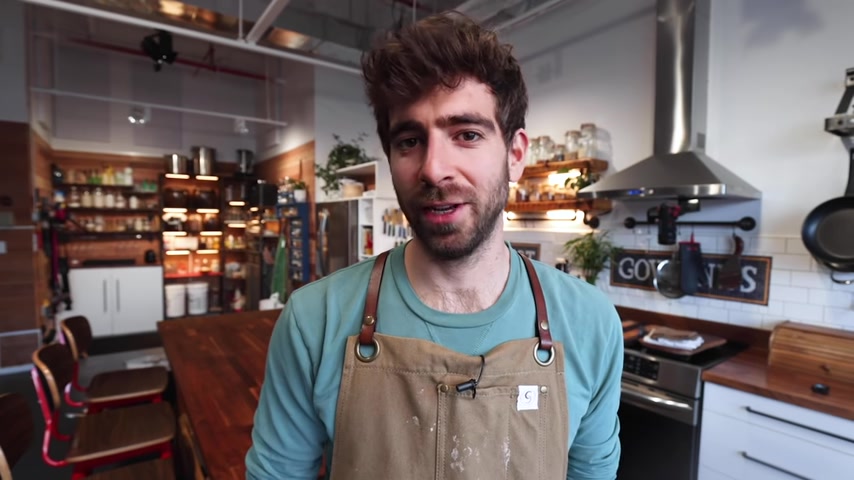
All right .
So there are so many other steak tutorials on the internet .
So why are you here ?
Why are you watching this video ?
Why are you gonna keep on watching this video ?
Well , the truth is a lot of these other videos , they focus on singular cooking techniques and when it comes to steak , when it comes to feeling confident , when you get into the kitchen to prepare that steak , there's just so much more going on from the second you pick out that steak to the final product .
This video is gonna be covering all of those essential elements along the steak making process that you need to understand to really tune in and make the perfect steak at home .
All right , let's talk about picking the right steak , which is step one of course , but it can be a bit overwhelming because there's a lot of different cuts out there .
And that term steak , it can be used of course , for other animals , even fish , you can get fish steaks .
But for whatever reason , beef just sort of dominated that term .
So when we think of the word steak , we think of a beef steak .
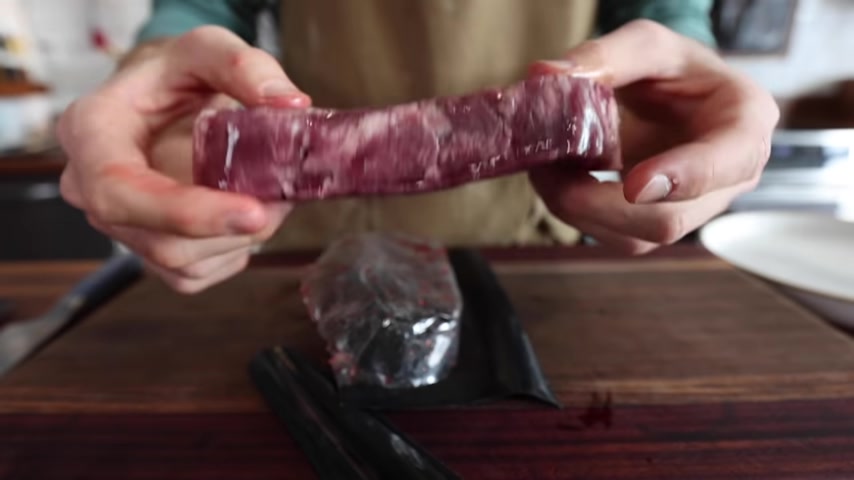
Now generally steaks are coming from Mussels on the animal that are doing less work , which means by nature , they are more tender , less connective tissue .
So all you have to focus on is searing them up , getting a nice crust and then cooking them to your desired doneness .
Now , I've got three of the most common steaks right here and they all come from the back of the cow which makes sense .
The back is not doing as much work as say , the shoulders or the neck or the leg first off .
You have the rib eye right here , which is cut from the center of the ribs .
And you can see that there's a ton of intermuscular fat .
You've got the little strands running throughout , but then you also just have caps these little chunks of fat in a few spots and with all that fat , you have one of the more flavorful and definitely beefiest tasting steaks , but you've got a little more texture , a little more chew to this steak .
But people love rib eye .
I'm a big fan of rib eye and then moving over here , I have the New York strip steak , which comes from the short loin of a cow .
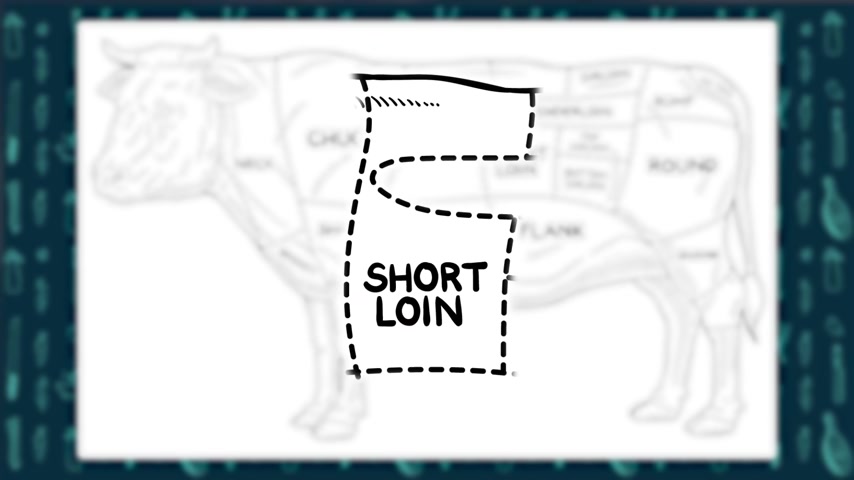
You can see there's a fat cap that runs on one side of it , which should mostly be trimmed down and you've got a good bit of intermuscular fat , not as much as the rib eye .
This steak still has a lot of flavor , but it's super tender and it , and it's just really good all around steak pretty easy to cook .
So great for beginners .
And then finally over here , I've got the filet , this little nugget right here , which also comes from the short loin and this is considered the most tender cut of beef because it's one of the most protected Mussels .
It's really not doing much work .
So it's gonna be nice and soft and just buttery smooth .
There's not too much fat running through this tenderloin , it's super lean .
So you've got to be careful when you cook this because it's easy to dry out .
You don't have to protect from the fat .
Now , if you take this New York strip and you take this filet , well , you've actually got a T bone steak right there .
These are actually connected by a bone right in the middle .
A T bone is a popular steakhouse cut if you're really trying to ball out .
But for me , it's completely unnecessary as a home cook .
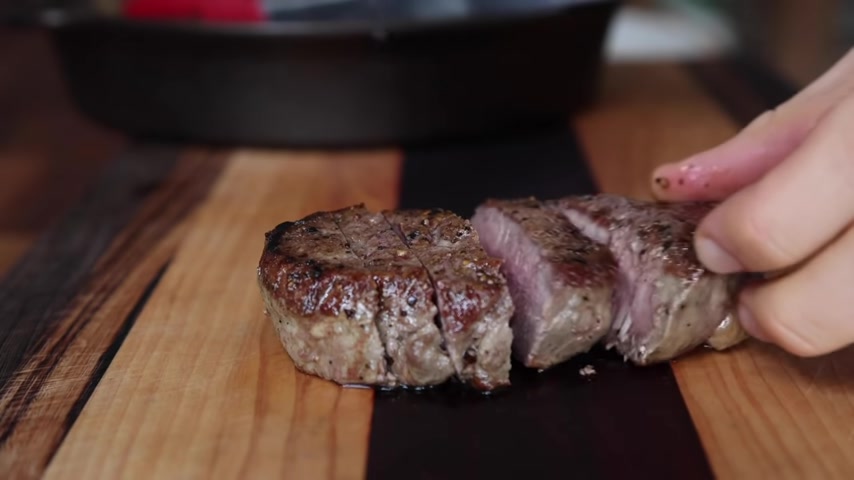
I've never gone to the butcher and asked for a T bone steak to cook at home because I would much rather cook these two steaks individually and really concentrate on the proper technique to get them perfect .
So I've given you some steak knowledge , hopefully you're feeling a little bit more confident about picking out the right steak that fits your preferences , but ultimately , you can't go wrong , just try them all at some point and see what you like best for me .
I'm going with the New York strip for this tutorial , but I'll probably end up cooking all of these at some point .
And the next step depends on where you're sourcing your steak for me .
I went with one of my favorite sources , which is the sponsor of this video Butcher Box , which the delivers 100% grass fed beef to your doorstep .
But you can also get free range organic chicken from Butcher Box .
You can get heritage free pork .
You can get wild caught seafood .
And I'm a big fan of Butcher Box because I'm a big fan of hunting down quality ingredients .
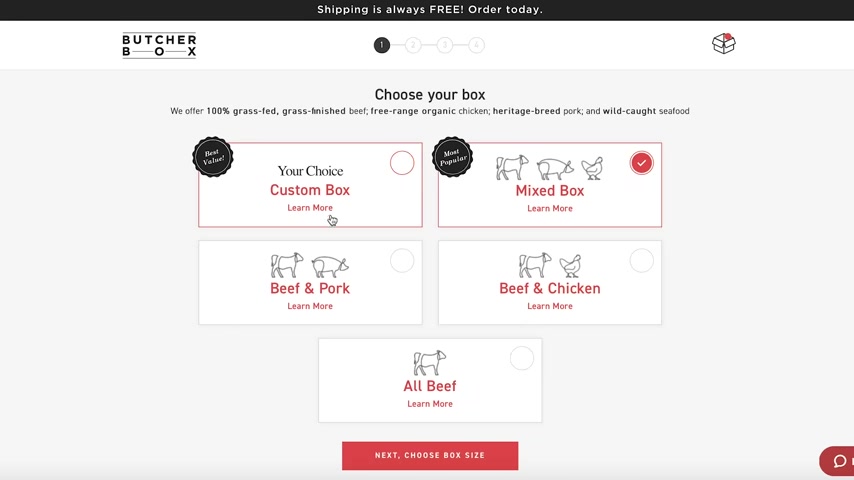
And when I'm eating meat , I want to make sure that meat is high quality and butcher box sources from farmers and fishermen who meet the highest standard for quality and all you have to do is choose your box type and delivery frequency , but you can push shipments or cancel at any time .
And if you don't want a curated box , you can totally just customize it , which is what I like to do .
And the meat and seafood is frozen at its peak freshness and it's packed in dry ice .
So when you get it , you know , it's going to be super fresh and I'm just a huge fan of grass fed beef because that's the natural diet of the cow .
But check out the link below in the description for Butcher Box .
If you're looking for some really high quality steaks .
But when these steaks shipped to me , they came in frozen .
So what I like to do is take one of the steaks out , toss it in the refrigerator overnight .
Too deep frost .
But still we have to nail down this next step , which is drying off the steak .
Even if you're getting your steak fresh from the butcher , there still might be some juice released from that steak And that is one of the easiest ways to completely screw up your crust .
So you can use a paper towel .
I was actually out of paper towel .
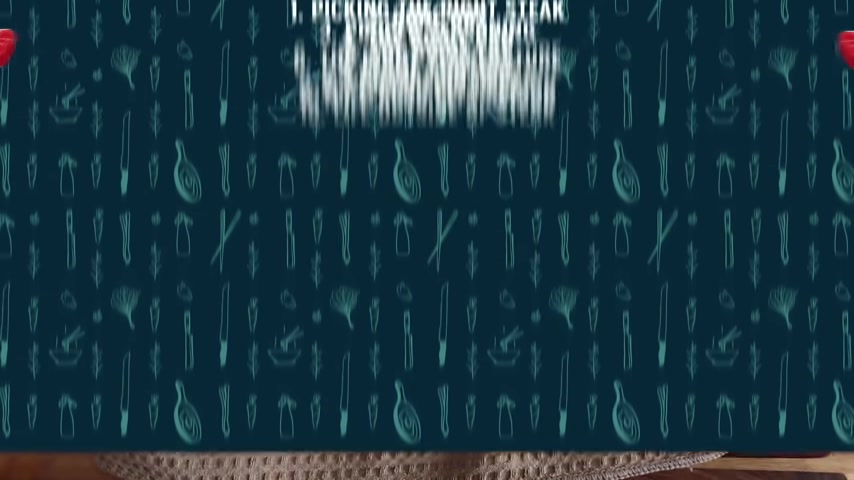
So I just used a clean kitchen towel to completely dry off your steaks before moving to the next step , which is seasoning your steak .
And this is pretty simple for me .
There's really no need to dry .
Brian a steak this thin .
But if your steak is thick , feel free to salt it and give it a few hours in the fridge , I'm just gonna make sure I get a nice coating of salt that will carry through the entire steak with every bite .
So don't skimp on the salt here .
And when it comes to pepper , it's ideal to get a coarser ground on there .
So you can protect your pepper from burning at those really high searing temps and make sure you don't waste any of that cutting board seasoning .
Give the side of your steak a little bit of love until it is fully seasoned on every side and then we're ready to move on to the next step , which is choosing the proper pan .
And you can see we have options here .
But the main thing you really need to consider when you're choosing the proper steak pan is you want something that's nice and thick , that's hefty because we need to retain a consistent heat if we want a really nice crust .
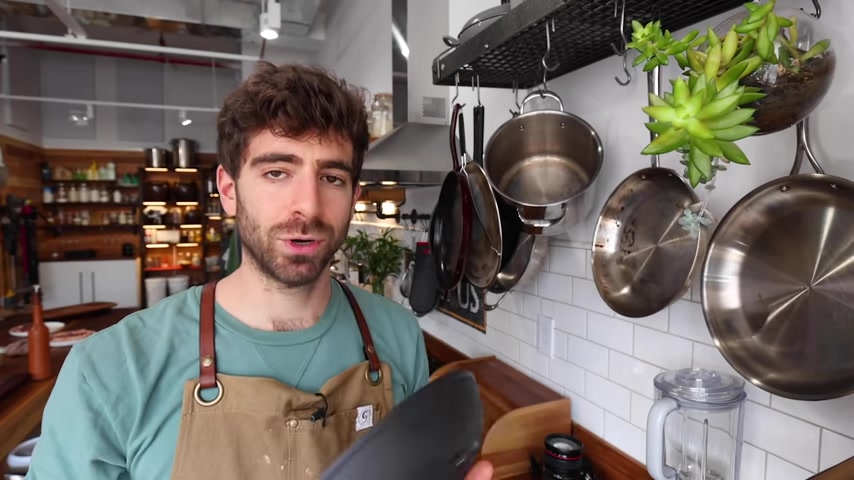
And when it comes to steak making , it's all about the crust .
This is a stainless steel skillet right here .
I would say this is a medium hefty , but you can still get a nice even heat in this .
Great for cooking steak .
Of course , you've got your cast iron .
This is the heftiest pan right here .
I mean , this thing is heavy , wonderful for cooking steaks or any type of meat .
And over here , I've got a nonstick pan and although this non stick is pretty hefty for a nonstick pan , it's best to avoid non stick coatings when you're cooking steak because you are cooking at such a high temperature that you don't want to ruin the actual coating on this non stick .
So for today , what am I gonna go with ?
Let's do the stainless steel pan and you just want to make sure that of course you can fit your steak in this pan .
For instance , it's a waste of energy if I'm using a pan this big , unless I'm going to be cooking .
Say three steaks at once .
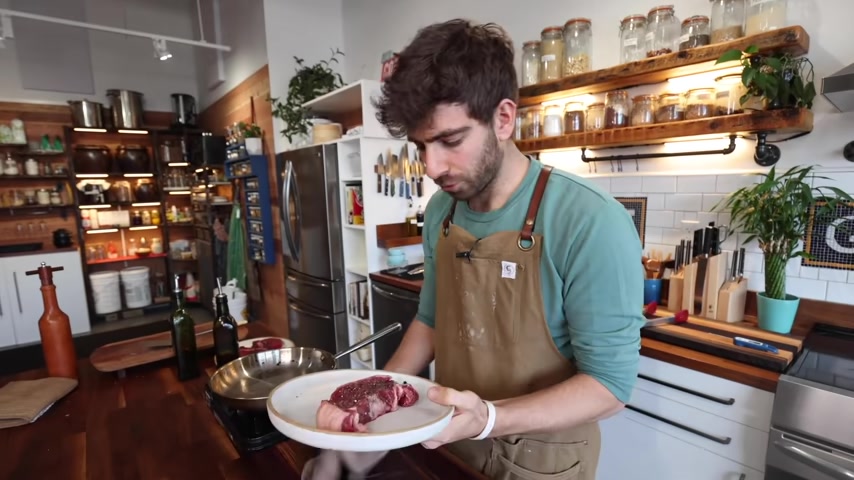
So all I need is this , I believe it's an eight inch stainless steel weapon of choice stainless steel pan .
Since this is a bit thicker , I want to get this preheating just to juice it up a little bit .
Give it a head start and check this out .
I left for five minutes .
You can already see that osmosis process starting from the salt .
So even though I patted off the liquid from the packaging , well , I've got to pat this down again because I cannot have that liquid boiling this steak .
You want to sear that on the bottom there ?
No good .
So let's talk about the next essential element to cooking the steak , which is picking the proper oil .
So we have this pan preheating and it's gonna be ripping hot if we want a nice crust , close to 400 F and all oils and fats have different smoke points .
So , if we have this thing ripping hot and we throw in a knob of butter , well , we're not getting any crust on this steak without burning the hell out of that butter .
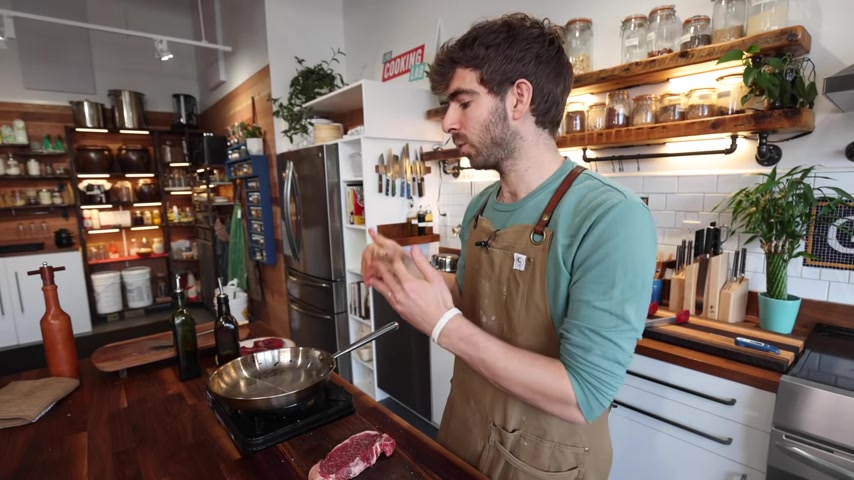
So you need an oil that can withstand the high temperatures that we need for the crust .
And one of the best ways to get that fat or oil is right here .
My friends see these big chunks of fat right here .
Well , you'll never render those down completely .
The internal fat that will render but these chunks you're just gonna be biting into a bunch of fat and I know some steak purists , they really like that and I'll , some of it , but there's no problem .
At least in my book with removing just a little bit of that fat .
You keep some for flavor and some for protection .
But a lot of times these steaks are just loaded with extra fat , like you might have a corner .
If you look at this rib eye , I'm gonna actually steal from this rib eye since I'm cooking a few steaks .
This rib eye right here , no one needs to buy into a piece of fat .
That big .
Come on , you don't need that .
So what we're gonna do is we're gonna chop those into really small pieces to help the rendering process .
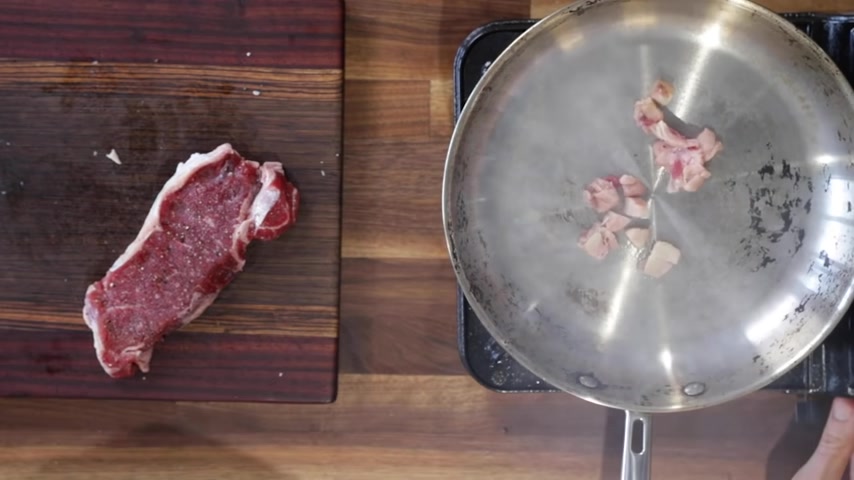
And when I say rendering , all that means is we are liquefying this fat right here right now .
It's in a solid form and we're going to liquefy it .
So , what I'm gonna do is just cook that over uh low to medium heat and that fat will slowly liquefy and we're gonna get a nice treat on the other side as well .
And then once you have a good bit of fat , after about 23 minutes , you can just tilt the pan just like that and you're just deep frying those pieces which will speed up the process just a bit , pop those chunky out .
So we've got fat in there and then on top of that .
Well , you've got yourself a little steak appetizer while your steak cooks .
Oh , these little crispy renderings steak bacon right there .
So , we've patted our steak dry .
But the next essential element to getting that nice crust is making sure your steaks are at room temperature .
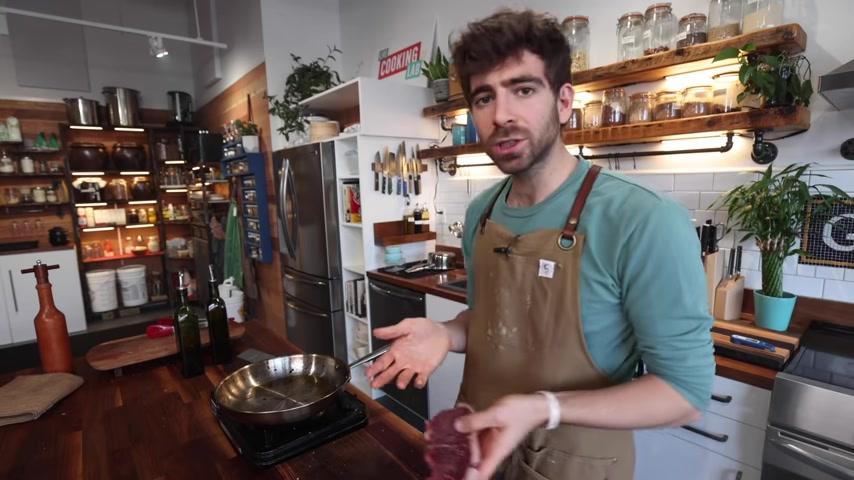
And I know people get a little weirded out about letting their meat sit at room temperature , but just take your steak out at least a half hour before an hour would be best .
We've preheated our pan .
We have this hot oil in there .
If we lay in a really cold steak , we're bringing the temperature down of that pan , then we need to bring the temperature back up .
And all of a sudden our crust is constantly fluctuating and we don't want that .
So I'm gonna lay this steak in and this is a pretty thin steak .
I mean , we're talking three quarters of an inch to an inch .
So I want to really hit it with that high flame and that's the next element you really need to get down to mastering steak is flame control .
No amount of time that a recipe tells you will really do you any good .
So if you're looking for an exact timing for each side , just get that out of your head right .
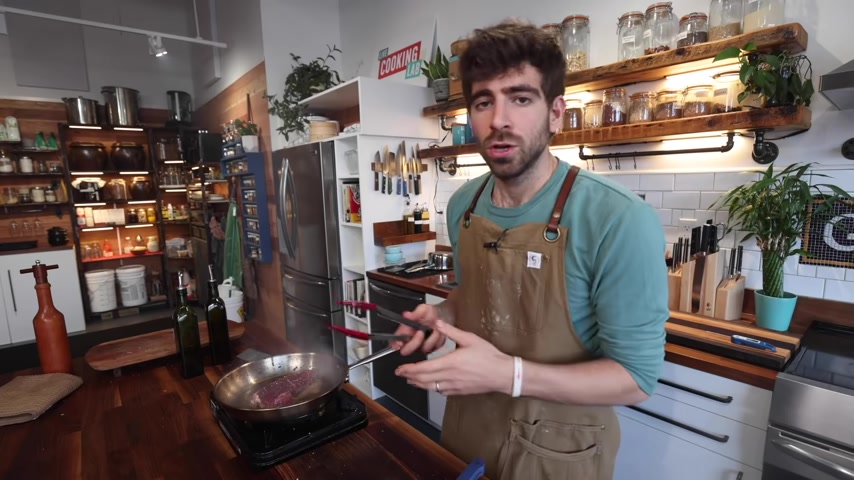
Now , what you need to do is understand flame control because there's so many variables when it comes to steak , your meat might be fattier , it might cook a little differently than other steaks .
Your appliances might give off a different heat .
If your steak is thicker , like an inch and a half , you can lower that flame and develop your crust over time without a concern of actually over cooking your steak .
It's about getting in there and really just paying attention to what's happening in this steak process .
So , let's check out this crust .
So I'm going to flip this and I'm just constantly swirling this steak right now .
Since you're cooking at such high heat , there's going to be a little burning .
It's just part of the game if you want that insane crust .
But swirling this around in the pan and just keeping it moving is one step to avoid extra burning .
If we look at this side of the crust , that's crusty to me and I think that's all it needs .
So I'm gonna take it off .
I'm gonna turn this flame off .
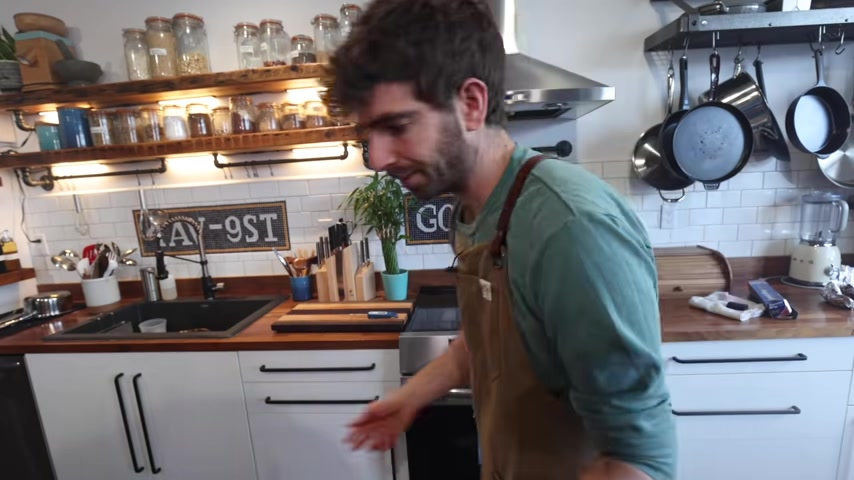
Give it a feel .
It's feeling pretty good .
And to be honest , this side right here , the first side is much crustier than this .
I mean , that's still , that's gonna be plenty of flavor , but this is like a thick crust .
And that's all right for me because this is a thin steak right here and I cannot risk over cooking it and drying it out .
I want that nice medium rare texture .
So I'll sacrifice just a little bit of crust on the other side .
All right , let's swing it right over here and talk about this thing right here , which is your convection heat , your oven .
So we've been cooking this steak completely on a direct heat .
And most likely this is cooked through because it's a thin steak .
You see some pretty massive steaks sometimes in the butcher and it can be tempting to buy those steaks , which is not a problem .
Those are delicious , but we might need to take advantage of convection heat , which is an indirect heat .
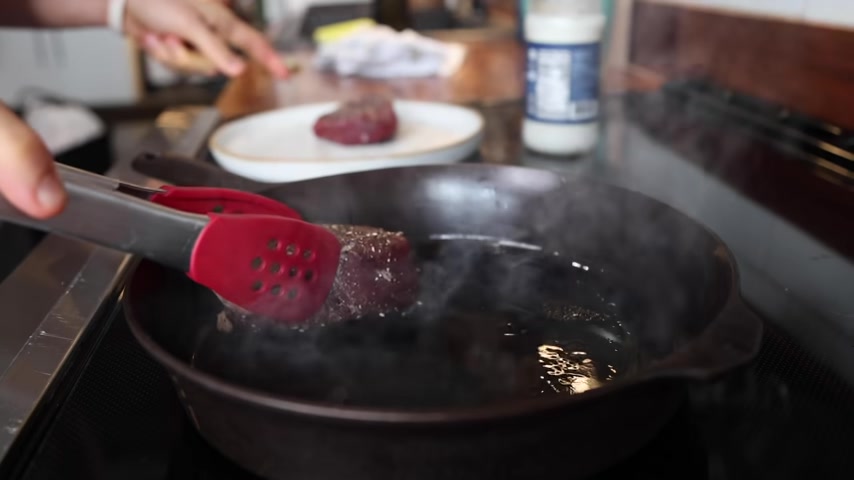
So we started off on the direct heat , get that crust , but you don't want to finish that steak on that direct heat because it will end up drying out if it's just constant direct heat to cook it through .
So there's no problem with taking a thicker steak getting that crust , throwing it in a low and slow oven at like 250 F , cooking that through to that perfect medium rare and ensuring that juiciness .
But since this is so thin , all I'm going to do is create a little personal oven here and just let that raise a few degrees as it sits here in this tin foil .
And that should be the perfect doneness .
You didn't really think I would leave all this flavor behind .
Right .
That's some amateur cooking right there .
Now , I could totally make a pan sauce or , you know , you could butter base your steak , whatever you wanna do , it's fine .
But what I'm gonna do is , take it a step further .
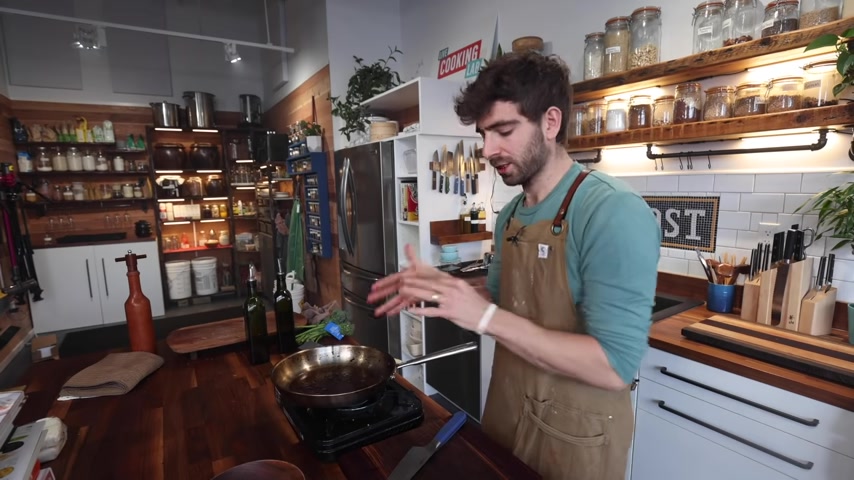
I'm gonna take advantage of this flavor , which is such a key element to making steak .
I'm gonna just slice this up really quickly and I'm gonna get it into this pan right here because what I'm doing is making a little noodle stir fry .
I know curveball .
You didn't think a noodle stir fry was coming from a steak video .
Right .
Well , I didn't either , but that's cooking for you .
So I'm gonna get that in there .
There's plenty of fat in there , plenty of flavor and just let those onions absorb it .
There's also a lot of salt in there as well .
So you really don't need to sell your aromatics that are going into the pan at this point .
I also have some broccolini right here .
This is a family member of broccoli .
But what I like about this is super thin and delicate .
So it cooks up really quickly and stir fries .
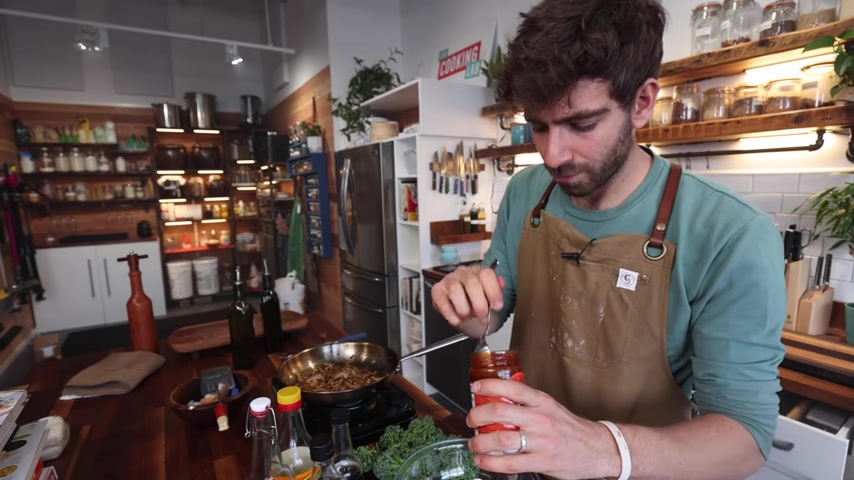
So the onions have absorbed most of that oil and they're looking just a little bit dry , especially because this broccolini is going in there .
So I'm just gonna add a little bit more oil to the pan .
And while those are cooking , let me work on this sauce , ah , when it comes to making a stir fry sauce , it couldn't be simpler .
I mean , number one , you got to build up your Asian pantry a bit , which you can do over time .
You might already have a bunch of these ingredients , but it's all about balance .
I'm gonna start with some which is a Korean fermented chili paste .
This is going to be the base of my sauce .
A good amount of heat , a good amount of funk and a whole lot of flavor .
That's for damn sure .
Then let's go in with another umami salty kick .
Of course , you got your soy sauce .
I'm just gonna do two spoons of that .
I've got some rice vinegar .
This is actually brown rice vinegar .
Two hits of that .
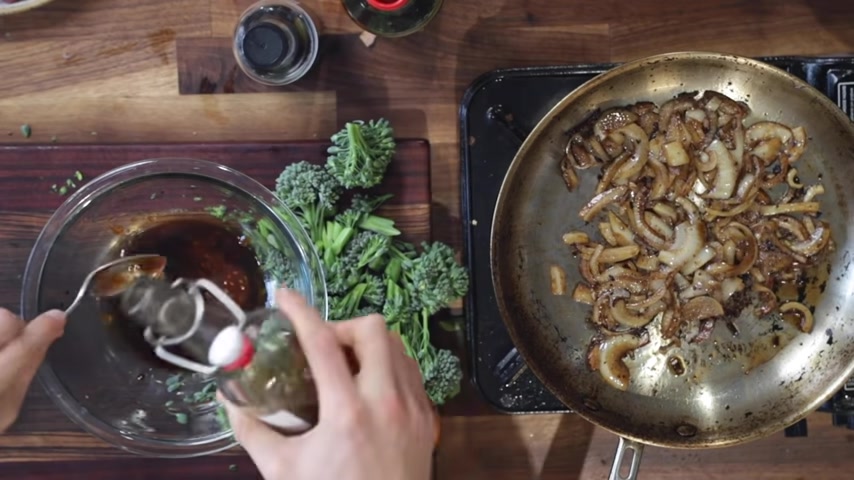
That's your acidic element to really make your stir frice pop , which is so essential .
You want it to pop another acidic element .
A little bit of cooking wine .
I'll go with two hits of that and then my final element is just a little bit of which is gonna add some really nice sweetness and I'll stir that up , use whatever you have in your pantry .
I don't care .
Just make sure it's balanced and tasty .
Oh , damn .
That's good .
Oh Did my flame run out , son of a ?
All right .
We're moving over here because my flame on my portable stove ran out .
Luckily I have an actual stove back in action .
So I am going to take broccolini .
Get that in the mix .
I'll just hit it with a little bit of water that's going to help cook down that broccolini .
So what I have here are some fresh rice noodles .
You can use dried rice noodles .
And just soak them and throw them in here .
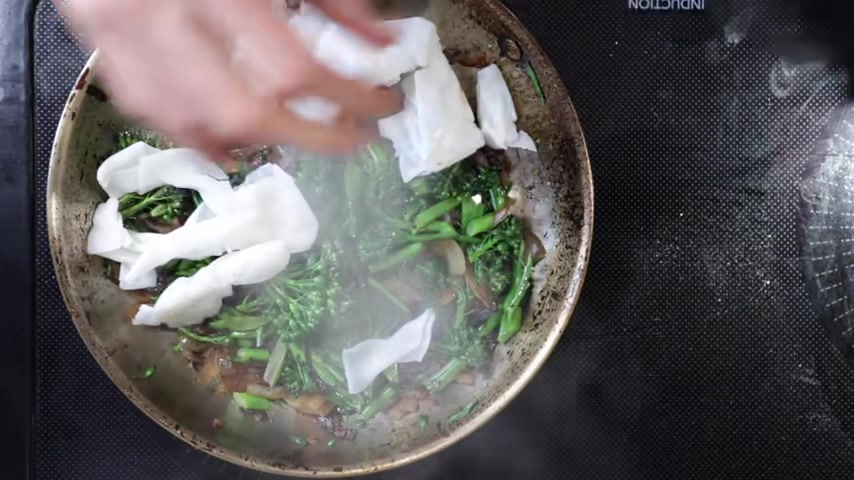
But if you can find fresh rice noodles in Chinatown or in your local market , definitely go for that .
And I'll just toss those in .
Let's see if my pan can handle all of them .
Yeah , I think it can .
And you can see these rice noodles right now are a bit dry .
So , what do they need ?
They need some hydration .
That's where this beautiful stir fry sauce comes into action .
And we'll just let those rice noodles hydrate and then we can stir fry .
And of course , the last step you might be asking , why am I making this stir fry right now ?
In a steak video ?
Well , we're turning this into a steak noodle stir fry .
So we've got our beautiful steak right there .
All those juices coming off .
That's a bonus right there .
Never waste juices .
That's flavor , right ?
So let's slice into this steak and see what we have .
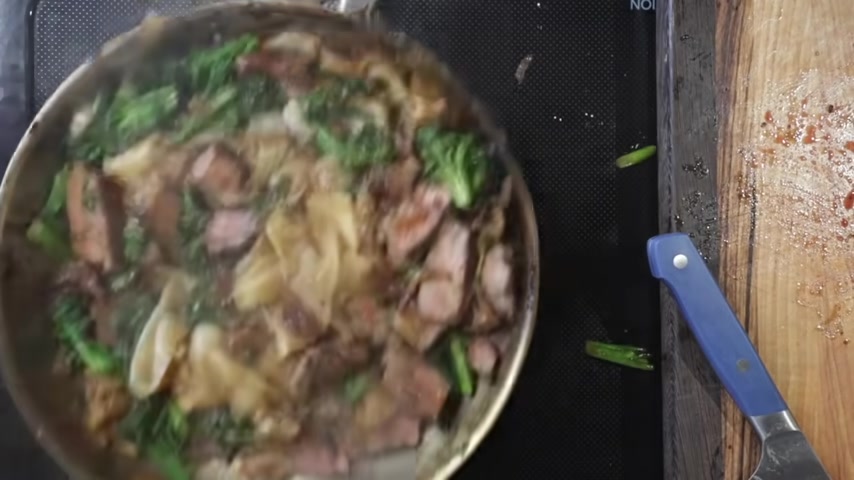
So you can see right there .
I would say in between medium and medium rare .
So I'm gonna slice these right in half .
Pop that in there .
Just stir fry that up for about a minute .
You don't want to overcook this steak .
You just want to let that sauce really coat those chunks of steak .
I know we took a bit of a left turn there .
But for me , I grew up eating just hunks of steak .
You grill it up , you serve it up with a few sides and that was that .
And for me it was just boring .
It was bland .
I didn't like it .
And then I got a little older and I realized , ok , at least a little sauce on my steak gives it a little extra something .
But really the last thing I'll leave you with is that steak doesn't just have to be steak .
It can have a life outside of steak .
You can extend it pretty easily into a bigger dish .
And that's generally how I eat meat these days .
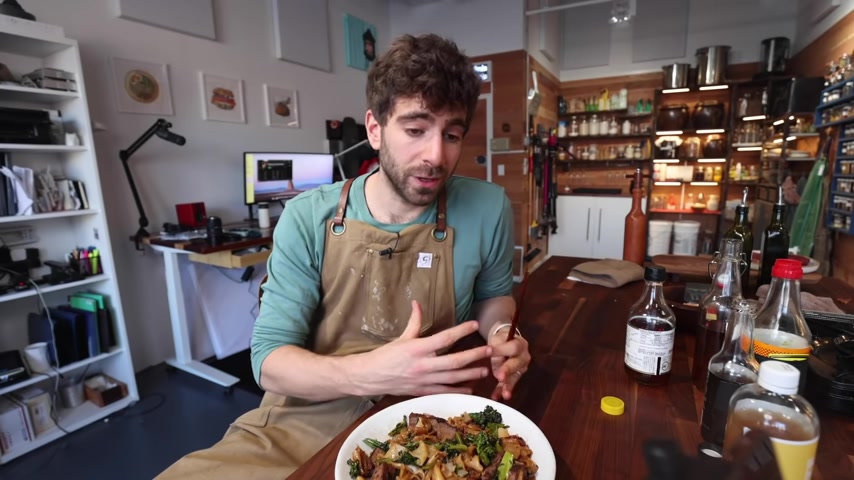
I start with a cut of meat and I figure out how to expand it into something that can feed a few people like this dish right here .
And thank you , of course , the butcher box for supplying some really high quality beef .
And I'll see you in the next video .
Yeah .
Are you looking for a way to reach a wider audience and get more views on your videos?
Our innovative video to text transcribing service can help you do just that.
We provide accurate transcriptions of your videos along with visual content that will help you attract new viewers and keep them engaged. Plus, our data analytics and ad campaign tools can help you monetize your content and maximize your revenue.
Let's partner up and take your video content to the next level!
Contact us today to learn more.